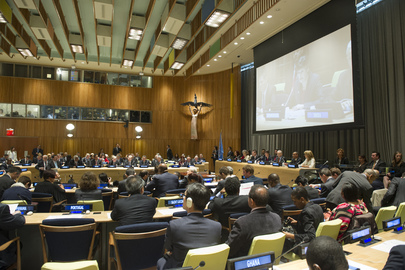
Earlier this month, states that participated in the UN Conference on the Arms Trade Treaty last March were allowed to sign the document. The ATT—designed to curb the sale of small arms and ammunition to terrorists, criminal gangs, and organizations committing human rights violations or genocide—passed a UN General Assembly vote with 154 in favor, twenty-two abstaining, and three countries—Iran, Syria, and North Korea—voting against. As of this writing, sixty-two countries have signed the document, with fifty needing to ratify it in order to become international law.
Proponents of the treaty, including Assistant Secretary of State Thomas Countryman, who led the US delegation in the conference, claim that the ATT is a morally imperative international agreement. The opponents, on the other hand, feel that while a great sentiment, the ATT as negotiated will be ineffectual in preventing the spread of malicious weapons sales.
Looking at the record, and after hearing a discussion on the UN ATT hosted by the Atlantic Council’s Brent Scowcroft Center on International Security that included Countryman, American University’s David Bosco, Oxfam America’s Scott Stedjan, and Defense Small Arms Advisory Council’s D. Allen Youngman, it seems that the skeptics have a good case, making ratification by fifty states an unnecessary endeavor.
Take, for instance, the civil war in Syria. If the United States wished to back the anti-Assad forces, as Bosco pointed out, US government officials would have to assume a high probability of human rights abuses being committed at some point in the conflict by rebel groups (indeed, as recent reports confirm, they already have). Therefore, under the ATT, US manufacturers would be prohibited from selling arms to Syrian rebels. A country that does not sign the ATT, however, is not bound by these rules and could sell to the rebels if it so chose. Further, and more cynically, a country could sign the ATT and conceivably still sell weapons to malicious entities since there is no enforcement mechanism. In fact, the only mention of enforcement in the document merely states that each nation “shall take appropriate measures to enforce national laws and regulations…that implement [the] treaty.” This means it is up to states to decide what “appropriate measures” are; in other words, the treaty does not do much to influence current behavior since states already regulate their “measures.”
The ATT blinds decision-makers and the public to the sad truth: the best option is sometimes the lesser of two evils. Continuing with the Syria example, the best policy in the interest of the United States and the Syrian people might be to arm the rebels. However, due to human rights restrictions, that would no longer be a lawful option under the treaty. Thus, Assad’s forces would continue to receive a steady supply of weapons while the rebel stockpile would diminish, tipping the scales severely in favor of the regime.
The UN Arms Trade Treaty is just feel-good regulation without much substance. It fails to take into account the fact that very seldom is there a purely benevolent actor. Trying to remove the “bad option” takes the “least bad option” with it, assuming a world of only “good” and “bad” options which does not exist. While the intentions of the ATT are well-disposed, the real world is rarely so Manichean.
Surely, since conventional arms are the most used weapons of violence, something needs to be done to halt their destructive use. But it hardly seems the ATT will be an adequate solution. Removing weapons sales to popularly supported groups fighting for rights and general welfare removes the hope of the very people the United Nations pledges to protect. And that, ultimately, is the failure.
Alex Ward is a program assistant in the Brent Scowcroft Center on International Security at the Atlantic Council. Morgan Timme is an international relations student at the College of William & Mary.
Photo credit: UN Photo/Eskinder Debebe
Image: 552387.jpg
